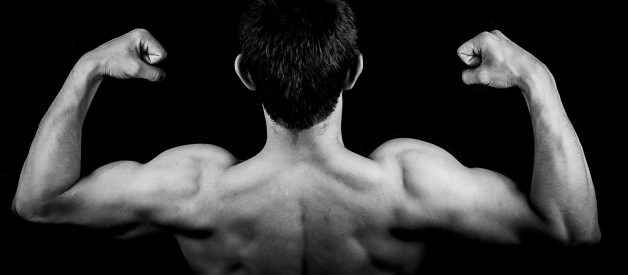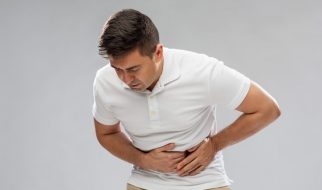Feeling sluggish and less than sexy? Low testosterone could be the cause
 Photo by lukaszdylka via Pixabay.
Photo by lukaszdylka via Pixabay.
Testosterone needs no introduction, but I?ll give it one anyway. This nifty little hormone makes your muscles grow, your bones strong, and your naughty bits work.
That much you probably knew. Less well-known is that testosterone is also essential for proper mental function and mood regulation ? so much so that men with low testosterone usually suffer from clinical or pre-clinical depression. And testosterone deficiency is on the rise ? 10?40% of men around the world suffer from it, and that number is increasing.
This goes for women, too, by the way ? testosterone deficiency is common in women (primarily those over 40), although it?s hard to put a number on just how prevalent it is. What is known is that for many women, it?s a bad enough problem that raising testosterone levels can significantly improve libido, musculoskeletal health, and even cognitive ability. Yes, women need testosterone too, just as men need estrogen.
Testosterone levels not only go down with age, but average testosterone levels have steadily declined for the past several decades, for reasons that are only partly understood.
Having low testosterone is?not fun, to say the least. A lot of guys get so fed up with it they end up going on testosterone replacement therapy. And while that certainly works, it has its side effects, including baldness, infertility, elevated cholesterol, and other cardiovascular risk factors, and possibly, ironically enough, sexual problems.
So how can you tell if you have low testosterone? It takes a combination of blood tests and looking at your symptoms.
Symptoms of low testosterone can include reduced sex drive and low fertility in both men and women. Hair loss (in men), fatigue or sluggishness, and sleep disturbances are other possible symptoms, as are other signs of hormone imbalance?like irregular menstrual cycles in women or hot flashes (yes, in men, too).
If you have symptoms of low testosterone, ask your doctor for a complete male or female (according to your sex, obviously) hormone panel. Get a thyroid hormone panel, and test for anemia as well as common nutrient deficiencies like zinc and B vitamins, as some of those can produce similar symptoms to low testosterone.
Regardless of what your test results say, remember that it?s not a problem unless you have symptoms that significantly worsen your quality of life. Some people honestly feel their best at relatively low testosterone levels, and your goal should be to make yourself feel good and improve health markers like inflammation and body fat percentage, not to get your testosterone levels as high as humanly possible.
Needless to say, taking drugs should be a last resort. Fortunately, there?s a lot you can do to increase your body?s natural production of testosterone, while also making yourself healthier overall.
Priority #1: Maintain a Healthy Body Weight
As you?ll see throughout this article, there are a lot of things that impact your hormonal system, and thus there are many things you can do to raise your testosterone. However, none of them are as important as simply not being overweight.
Body fat levels have a strong and consistent negative correlation with serum testosterone. In weight loss studies where testosterone was measured, there is a nearly linear association between the amount of weight loss and the increase in testosterone experienced by subjects. People with more testosterone also, unsurprisingly, have more muscle mass.
Part of the reason for this is that fatty tissue produces aromatase, an enzyme which converts androgens ? including testosterone ? into estrogens. Estrogen, in turn, reduces testosterone production via negative feedback in the hypothalamus, so excess body fat tends to cause both high estrogen and low testosterone. The testosterone/estrogen ratio is a prime indicator of sexual health; its decline in obese men is perhaps the most significant mechanism underlying the link between obesity and poor sexual health in men.
Your number one priority should thus be maintaining a low body fat percentage. At the very least, your body mass index should be kept below 25 ? click here for a BMI calculator. For most people, BMI is a perfectly decent proxy for body fat levels.
If you are very muscular, however, your BMI might go into the overweight range, despite a low body fat percentage. In that case, you should actually calculate your body fat percentage using either a body circumference formula (measure your waist and hips with a measuring tape) or use a high-tech method like DEXA ? dual emission x-ray absorptiometry.
Even if you?re not overweight, your testosterone levels will continue to increase, and your estrogen levels decrease as you lose fat within the normal range. So there is a benefit to being very lean vs. merely not being overweight; however, the returns do start to diminish. Note that while it is possible to be too lean, this only happens at very low body fat percentages, like those achieved by bodybuilders preparing for a competition. As a rough guideline, you should aim for having a flat belly?but sixpack abs are not necessary.
As a final note, losing body fat will go hand in hand with several of the other things I?m going to talk about in this article. Excess body fat is a main cause of sleep disorders, for instance, and you?ll tend to lose fat if you exercise and eat well. There is also a two-way relationship between body fat and testosterone, so anything you do to raise your testosterone levels will also help you lose fat.
Nutrition for a High-Testosterone Diet
Several aspects of your diet will influence your testosterone levels, including calorie balance, macronutrient ratios, and micronutrient?vitamin and mineral?content.
Although losing weight is a great way to raise your testosterone levels, being in a sustained caloric deficit actually lowers testosterone levels in men. Caloric restriction also raises cortisol, a stress hormone which derives from the same precursor hormone as testosterone.
If you?re overweight, some amount of caloric restriction will be necessary to lose fat. However, this adaptive decrease in testosterone levels means there may be a delay between when you start losing weight and when you start to see your testosterone levels go up. It also implies that once you reach your target weight, you should ease off the caloric restriction and let yourself eat as much as you want, so long as you don?t regain the fat you lost.
When possible, it?s best to lose weight by adding physical activity rather than restricting caloric intake. Increasing physical activity does more to raise testosterone ? in addition to building muscle, stamina, and all the other benefits of exercise.
Now for macronutrients?fat, carbohydrates, and protein. What does the research say about those?
Studies consistently find that diets higher in fat support higher levels of anabolic hormones?including not just testosterone, but also estrogen and growth hormone. Based on the research, in order to maximize testosterone levels you should be getting at least 40% of your calories from fat (and maybe even more).
The study also found that saturated and monounsaturated fat, specifically, were positively correlated with testosterone levels, while polyunsaturated fat was not. In other words, meat, nuts, avocados, and olive oil are helpful, while corn, safflower, soybean and flax oils should be avoided.
If fat is good, you might expect carbohydrates to be bad, but that?s not quite what studies show. No direct correlation seems to exist between testosterone levels and carbohydrate intake.
Surprisingly, that study also found that protein intake was negatively correlated with serum testosterone concentrations. Indeed, other studies have found that replacing carbohydrate intake with protein lowers testosterone production. The attitude towards protein in many fitness circles can be summed up as ?the more the better,? so it?s interesting to see that you actually can have too much of a good thing. In most cases, protein intake should be between .6 and 1 gram of protein per pound of body weight per day. More is hardly ever necessary for any health or fitness purpose.
Micronutrients ? vitamins and minerals ? are also critical for maintaining high testosterone levels.
Vitamin D?arguably a prohormone rather than a vitamin ? is needed by the body for many different hormonal, structural, and neurological functions. Vitamin D supplementation at 3000 iu per day has been shown to raise testosterone levels in men who are deficient in vitamin D.
Another study found that vitamin D supplementation did not significantly raise testosterone in men who were not deficient?however, the dosage was also a little bit lower, and the study duration much shorter than in the first study. The second study nonetheless found an improvement in insulin sensitivity, which would be expected to cause fat loss over the long term.
Vitamin D is mainly produced by the body in response to sunlight, but it?s difficult to get enough sun to truly optimize your vitamin D levels ? particularly without raising your risk of skin cancer. Based on these studies, supplementing 2000?3000 iu of vitamin D per day is probably a good idea.
Zinc is perhaps even more important than vitamin D for maximizing testosterone production. In one study, healthy young men saw a nearly 75% reduction in testosterone levels after 20 weeks of zinc restriction. Older men who were only mildly deficient in zinc were able to double their serum testosterone levels by supplementing 40 mg of zinc gluconate per day for six months.
Zinc may also reduce the production of aromatase, thus improving the testosterone/estrogen ratio. This has so far only been proven in rats, however.
The best dietary sources of zinc are animal products like meat, dairy, and eggs, followed by nuts, seeds, and legumes. Because zinc deficiency impairs your sense of taste, you can test for it using a simple over-the-counter zinc assay consisting of zinc sulfate heptahydrate. People with adequate zinc status will find this stuff tastes like hydrogen peroxide, while the zinc-deficient will perceive little or no taste. If you are zinc deficient, 10?25 mg a day should be plenty ? the 40 mg used in that one study is excessive for anyone consuming a decently healthy diet.
Magnesium is another mineral that is necessary for both optimal sleep and the production of testosterone. It is primarily found in leafy greens like spinach and chard, but very few people eat enough magnesium?and people who exercise more need more magnesium.
Supplementation of magnesium has been shown to increase testosterone levels, with people who exercise deriving more benefit from magnesium supplementation than people who don?t exercise. In addition to raising total testosterone levels, magnesium may also make the testosterone in your body more bioactive.
Because it has a relaxing effect, magnesium is best supplemented in the evening. A word of warning: most magnesium supplements use magnesium oxide, which is poorly absorbed and acts primarily as a laxative. Magnesium should be taken in a different form, like magnesium gluconate, citrate or threonate. Powdered fizzy drinks like Natural Calm are absorbed quickly and efficiently and are the most effective at aiding sleep.
B vitamins may also be important for maintaining testosterone levels, although the data is a bit more spotty here. Vitamin B12 deficiency has been implicated in testicular pain as well as impaired sperm production. Additionally, vitamin B6 seems to be needed not necessarily for maintenance of blood hormone levels, but for the health of testosterone and estrogen receptors.
The best B vitamin sources are animal products, legumes and leafy greens. Based on the research, a daily b vitamin supplement is likely to be helpful, although it probably won?t have a big impact on hormonal functioning.
Sleep and Testosterone
After diet, sleep is the next biggest factor that affects your body?s testosterone production.
Common wisdom holds that people should sleep eight hours a night. In this case, the common wisdom is more or less correct ? for the general population, sleeping seven to nine hours a night is associated with good health, including lower body weight and adiposity. Sleeping less than seven or more than nine hours a night are both associated with worse health outcomes.
However, that?s for the general population, and there is substantial evidence that the more you exercise, the more sleep your body needs to recover. If you exercise far more than average, you may benefit from sleeping a little bit more. In at least one study, college athletes showed across the board improvements in performance when they slept at least ten hours a night.
The benefits of extra sleep can go even further. Lebron James famously sleeps twelve hours a day. For people who exercise a lot but aren?t athletes, a good guideline would be to add an hour to the average sleep requirement?so eight to ten hours a night.
That?s great for overall fitness, but what about testosterone? Unsurprisingly, lack of adequate sleep also lowers testosterone levels. One week of sleeping only 5 hours a night lowers testosterone by around 15% as compared to sleeping 8 hours a night.
Quality of sleep matters at least as much as total duration. The amount of time spent in slow wave, or ?deep? sleep, is strongly positively associated with testosterone levels, independent of total sleep duration. Interestingly, this study found no correlation between testosterone and total sleep duration. Because sleep duration wasn?t experimentally controlled, it?s likely that people who didn?t sleep well simply tried to make up for it by spending more time in bed. The results of the study suggest that this doesn?t really work; you can?t make up for poor sleep quality with more sleep quantity.
That study also makes the point that many of the sleep issues that cause low testosterone are, themselves, caused by being overweight. In particular, excess body fat can cause obstructive sleep apnea, which causes reduced blood oxygen concentrations during sleep as well as frequent nighttime awakenings. These problems are reversible by losing weight.
Sleep is probably the second-most important factor that goes into testosterone production, after diet. I?d also argue that it?s the single most important factor for overall subjective well-being. If you?re not sleeping like a baby every single night, it?s worth making the effort to sleep better.
How to Exercise for High Testosterone
Exercise is important for maximizing testosterone, especially if you need to lose weight. Not only can physical exercise help you lose weight, but it also raises testosterone production in and of itself.
Not all forms of exercise are equal here. Cardio and aerobic exercise programs show an inconsistent or unclear impact on testosterone levels, although they?re almost always great for overall health. Higher-intensity forms of cardio, like interval sprints, may have a greater impact on testosterone compared to low-intensity steady-state cardio.
Resistance training, i.e. weightlifting, has consistently been shown to cause an acute post-workout spike in testosterone in men; in women, most but not all studies find this spike to occur. Compared to men, women are less dependent on testosterone overall for growing muscle, and more dependent on growth hormone.
Age also makes a difference here, as older people show a blunted hormonal response to exercise.
Fewer studies have looked at the long-term effects of resistance exercise on testosterone, but those that have usually find improvements. In one study, obese men experienced an increase in testosterone after twelve weeks of resistance training.
Other studies have looked at what happens to your testosterone levels after you stop training. Recreationally trained older women who stopped training for 12 weeks showed a major decrease in testosterone levels. On the other hand, male power-athletes improved their testosterone by taking two weeks off, so people who exercise a lot may actually benefit from taking the occasional short break.
Overall, exercise, even weightlifting, doesn?t seem to impact testosterone levels nearly as much as diet and sleep. In fact, exercise seems to work in part by up-regulating the testosterone receptors in your muscles, rather than raising testosterone concentrations.
That said, exercise is critical for health and longevity. As a rough guideline, you should lift weights for 30?60 minutes 3?4 times a week, and do 20?40 minutes of cardio 2?4 times a week to optimize both health and testosterone levels.
Health Habits That Affect Testosterone
The effects of alcohol on testosterone levels are somewhat counterintuitive. While you would probably expect alcohol to lower testosterone production, consuming a low dose of alcohol actually acutely increases testosterone in men.
Consuming larger doses, or drinking alcohol for the long term, has about the effect you?d expect. One night of binge drinking can reduce a man?s testosterone levels by up to 40%, although the damage only lasts a day or two.
Chronic alcohol consumption is much worse; it can cause testicular atrophy, which may become irreversible at some point.
Surprisingly, the hormonal effects of alcohol seem more positive in women? for them, it raises both testosterone and estrogen. However, this is due to liver damage disrupting hormonal homeostasis?that?s not healthy for women.
Here?s an even bigger surprise: tobacco use doesn?t harm testosterone levels, and may even slightly improve them. This seems to be because nicotine blocks aromatase, inhibiting the conversion of testosterone to estrogen, as well as the appetite-suppressing effects of nicotine, which can aid weight loss.
Of course, any benefits will be negated in the long run by the deleterious health effects of smoking, particularly once it stops you from exercising effectively. However, the research does suggest that using nicotine patches, at least, may be helpful for men who have high estrogen and low testosterone.
Caffeine seems to have some sort of effect on testosterone and reproductive function, but the exact effect seems to be minor and not entirely clear. Consuming pre-workout caffeine magnifies the acute testosterone spike caused by exercise. However, it increases cortisol even more, so the hormonal effects may be a net negative.
In the long term, caffeine consumption is not correlated with testosterone levels. However, a large volume of research suggests that chronic caffeine intake is associated with impaired reproductive function. This seems to be related to DNA damage to sperm cells, so it?s not clear that this affects testosterone per se, but it?s of interest if you want to have children.
Of course, caffeine can indirectly lower your testosterone by preventing you from getting to sleep, or by impairing sleep quality even when you do get to sleep. If you drink more than one cup of coffee in the morning, it?s worth quitting caffeine for a while to reset your tolerance.
One final lifestyle factor to consider is stress, and for most people reading this I suspect it will be a more important consideration than alcohol, tobacco or even caffeine.
Chronic stress lowers your testosterone levels, primarily by raising cortisol. Since cortisol is made from pregnenolone, the same precursor hormone as testosterone, an elevation in cortisol will necessarily reduce testosterone via competition for raw materials. Chronic stress also impairs recovery from exercise, which further implies a reduction in testosterone.
Life stress also decreases libido, in conjunction with increasing cortisol but independently of its effects on testosterone. Interestingly, the association between stress and libido is different for men and women. Women lose sexual desire when stressed out, while men lose the desire to masturbate, but not the desire to have sex with a partner.
While not all studies show that stress significantly decreases testosterone, stress does seem to consistently reduce libido and sexual function in both men and women, albeit possibly via different hormonal pathways. In men, stress is associated with erectile dysfunction, and stress management training improves erectile function.
And of course, stress can make it hard to sleep, which?say it with me?reduces your testosterone and is harmful to your health. It is therefore imperative?both for testosterone but more so for overall health?that you do everything you can to reduce the amount of chronic (not necessarily short-term) stress you experience.
Start Raising Your Testosterone
Do another quick scan of this article and make an honest assessment of how well you?re doing in each of these areas ? diet, exercise, sleep, drug/alcohol usage, and stress. Pick the one or two areas in which you?re doing worst to focus on for now.
If it?s diet, start logging everything you eat and drink using a diet app like MyFitnessPal. Go on a relatively high-fat diet, like the paleo or ketogenic diets.
If it?s exercise: start using a standing desk and lifting weights three times a week, plus a few minutes of cardio after each weightlifting session.
If it?s alcohol or excessive caffeine use: stop, plain and simple.
If it?s sleep, you?ll need to figure out why you aren?t sleeping well. If you know you have a medical issue like sleep apnea, get it treated. Otherwise, you?ll need to systematically identify and treat the causes of your insomnia.
If stress is the issue, you?ll need to take a multi-pronged approach to treating it: by meditating, cutting out major sources of life stress, and possibly also cutting back on caffeine and sleeping better. You may also need to learn to schedule your day better to give yourself more time to relax.
Whatever the issue is, you may want someone to help you with it. You can get this by working with a personal trainer or nutritionist, hiring a coach, or even participating in health and fitness groups on sites like Facebook or Reddit.
Low testosterone is becoming an epidemic, and unfortunately, the modern environment?the junk food, the busy schedule, the late nights?often conspires to kill our testosterone levels. But with an active effort and a systematic approach, you can raise your body?s natural testosterone production, leading to better libido, better body composition, and improved overall health and quality of life.


